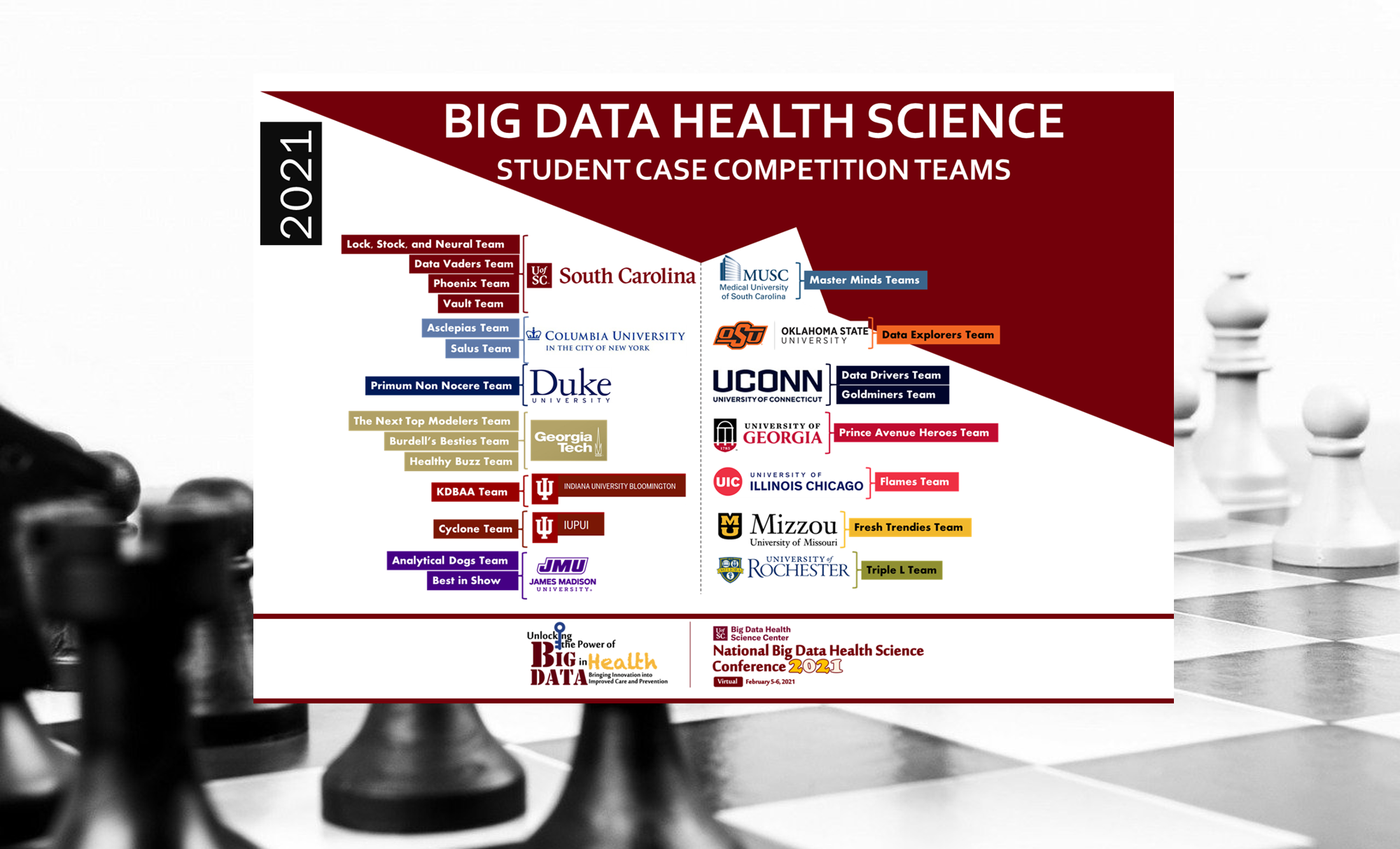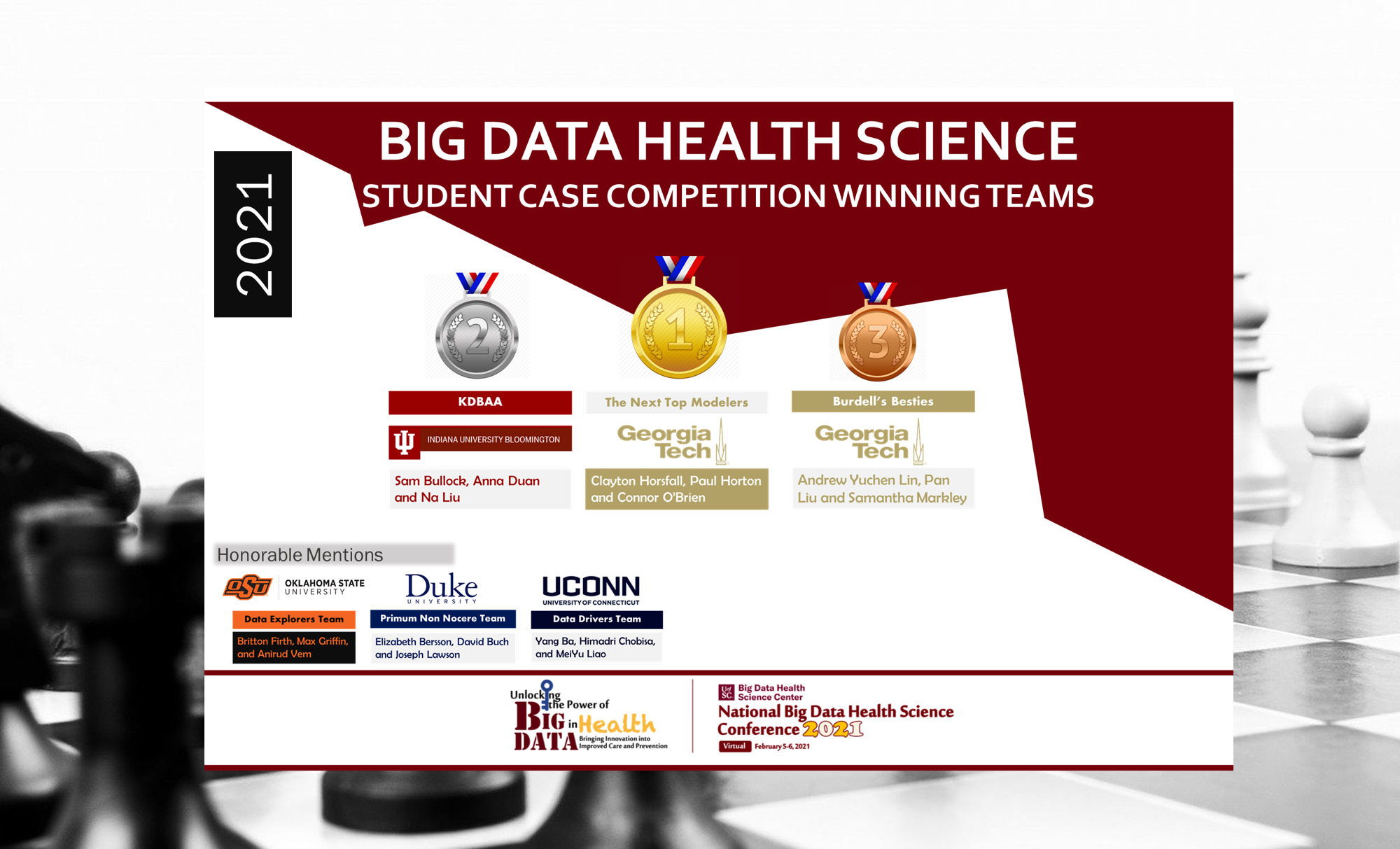A team from Georgia Institute of Technology won the $3,000 first place prize in the 2021 Big Data Health Science Virtual Student Case Competition that focused on solving inappropriate hospitalizations using a data analytics approach.
As part of the University of South Carolina’s 2021 National Big Data Health Science Conference, UofSC Big Data Health Science Center (BDHSC) held the 2nd Annual Big Data Health Science Case Competition virtually on January 29 – 31, 2021.
The Big Data Health Science Case Competition aims to provide enthusiastic teams of graduate and undergraduate students with the opportunity to apply their knowledge to the analysis of big datasets in healthcare. In its second year, the competition attracted 22 teams from 14 major universities in the U.S. including University of South Carolina, Columbia University, Duke University, Georgia Institute of Technology, Indiana University Bloomington (IU Bloomington), Indiana University-Purdue University Indianapolis (IUPUI), James Madison University, Medical University of South Carolina, Oklahoma State University, University of Connecticut, University of Georgia, University of Illinois at Chicago, University of Missouri and University of Rochester.

This year’s challenge focused on solving inappropriate hospitalizations using a data analytics approach. Each participating team analyzed the case and datasets. They have been provided with the international statistical classification of diseases and related health problems (IDC-10) codes for ACSCs. They were also provided data that contains all information about statewide inpatient hospitalizations for calendar years 2016, 2017, 2018 and 2019. Moreover, each team was given 24 hours to devise a solution for the case (January 30 [1st round] and 31st, 2021 [semifinals, and finals]. During this period, the teams were asked to identify the most prominent issues and develop a strategy to address key issues to help healthcare organizations achieve their goals of reducing inappropriate care utilization.
They implemented their best algorithm in a hospital setting to help the hospital avoid inappropriate hospitalizations. Each team presentation was judged by a panel of three to seven judges. These judges were composed of 14 representatives from industry and academia. After the preliminary round presentations, 6 teams competed at the final round. The 2021 Big Data Health Science Virtual Student Case Competition was open to undergraduate and graduate students at United States colleges and universities. The teams’ presentations were judged based on the following criteria: 1) Organization and Presentation of Facts, 2) Accuracy, 3) Relevance, 4) Case Objectives Met, 5) Professional Appearance and Timeliness, and 6) Ability to Answer Judges’ Questions.
Dr. G. Thomas Chandler, Dean of Arnold School of Public Health, announced the winners at his opening and welcome remarks of the UofSC National Big Data Health Science Conference on February 5, 2021. Paul Horton, Clayton Horsfall, and Connor O’Brien from Georgia Institute of Technology, Atlanta, GA, won the top prize. The second-place prize of $2,000 was awarded to Sam Bullock, Anna Duan and Na Liu from Indiana University Bloomington, IN while Andrew Yuchen Lin, Pan Liu and Samantha Markley from Georgia Institute of Technology, Atlanta, GA, won the third-place prize of $1,000.
Additionally, the teams of Britton Firth, Max Griffin, and Anirud Vem from Oklahoma State University; Elizabeth Bersson, David Buch, and Joseph Lawson Duke University and Yang Ba, Himadri Chobisa, and MeiYu Liao from the University of Connecticut received honorable mentions for their participation at the 2021 Big Data Health Science Virtual Student Case Competition.

The competition provided students with an opportunity to present their analysis, and recommendations to a broad panel of judges consisting of academia, business and healthcare industry.
“Really unique, eye-opening experience. Definitely not an easy competition! The organizers and judges were great, and we loved getting a chance to hear from folks in the top tier of the field of health sciences,” said Horsfall. “The structure of the problem statements was well thought out, providing us with a solid direction while leaving ample room for creativity. The judges, having given up their weekend to be a part of the competition, showed a genuine interest and investment in us and our work,” added O’Brien. “The panel of judges was selected with a background well suited to evaluate a competition like this. I was also glad that we used a real data set as opposed to one that was generated artificially for the competition,” told Horton. “I really enjoyed this unique experience attempting to solve real world healthcare problems using our data analysis skills. It is invaluable to receive all the questions and feedback from the academic and industrial experts,” said Liu.
The Big Data Health Science Case Competition is designed to be a hands-on experience that tests the students’ analytical, teamwork, communication, and presentation skills in order to build a talent pipeline in big data health science.
“I have aspirations to work in the healthcare field upon graduation, so I found this experience to further drive my passion for this field and career, and I plan to use this experience as a talking point for my future interviews,” added Markley. “All-in-all, this was a tremendous learning opportunity and I would highly recommend other students participate in a case competition like this to really stretch their muscles, put their classroom learning into practice, and to get a taste of what working with real life data is really like,” shared Bullock. “I was pleasantly surprised by the challenge of this competition. The time limit was short enough to foster creativity, yet long enough to flesh out ideas. It was an incredible, fast-paced learning experience that I would recommend to all students,” told Duan.
About BDHSC:
The University of South Carolina Big Data Health Science Center (BDHSC), as one of UofSC’s Excellence Initiatives, serves as a campus-wide interdisciplinary enterprise that conducts cutting-edge research and discovery, offers professional development and academic training, and provides service to the community and industry. The BDHSC consists of five content cores (Bionanomaterials Core, Electronic Health Records Core, Genomics Core, Geospatial Core, and Social Media Core) and two functional hubs (Technology Hub and Business/Entrepreneurship Hub) that promote the utilization of Big Data analytics in health-related research, service, and academic training. The combination of BDHSC Cores and Hubs represents a paradigm shift from traditional academic research to a focus on engagement and collaboration between academia, industry and community.
The leadership structure of the BDHSC follows a team science approach with two MPIs (Xiaoming Li and Bankole Olatosi). The BDHSC is based on a strong leadership team with a strong campus-wide representation of more than 40 faculty/staff from different departments and colleges/units, UofSC’s existing strengths in data science and health sciences, and innovative approaches that ensure optimal functionality and sustainability. The BDHSC is governed by a Steering Committee and supported by Internal and External Advisory Committees.
About the University of South Carolina National Big Data Health Science Conference:
The Big Data Health Science Conference is a signature annual event of the UofSC Big Data Health Science Center (BDHSC). The theme of the 2021 conference is “Unlocking the Power of Big Data in Health: Bringing Innovation into Improved Care and Prevention.” Highlights of the virtual conference include keynote and panel speakers from diverse areas of the health sciences, government, and academia as well as poster sessions, networking events, and breakout sessions in areas of electronic health records, geospatial, social media, genomics, and bionanomaterials research. The Conference was held virtually on February 5 – 6, 2021. More information is available at https://www.sc-bdhs-conference.org
